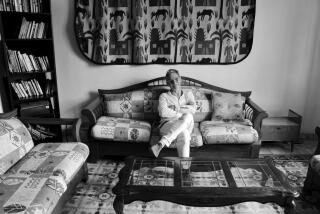J. Sabines: Prolific and Widely Loved Mexican Poet
MEXICO CITY — Jaime Sabines, a poet considered one of the foremost contemporary writers in the Spanish language as well as one of the most prolific, has died.
Sabines died of cancer at his home in Mexico City. He was 72.
“One of the best poets in our language,” was how Nobel laureate Octavio Paz, one not given to idle praise, once described Sabines. The death of Sabines on Friday came 11 months to the day after Paz died.
Since the death of Paz, Sabines had been considered Mexico’s most distinguished poet. To many, the modest, largely reclusive Sabines had long been the country’s most popular. On those rare occasions when he came out of seclusion to give a reading, the halls were filled to capacity.
Sabines wrote in a spare, stark and silky manner but employed vivid imagery in his writing. His subjects often were love and death.
To him, love between two people is linked with death, and death is an old acquaintance--which he spoke of often--that in the end is also part of life. But he wrote about both in such a simple, deceptively conversational way, that a reader might not realize until long afterward what he meant.
Among Sabines’ best-known poems were “You Have What I Look For,” “I Don’t Know if for Certain,” “The Poet and Death” and “Of Death.”
Some of his sharper poems, such as “Of the Myth,” were no more than four or five lines long. But their impact was tremendous. “Of the Myth,” like many others, is in free verse, but there is a subtle musical lilt to the words:
My mother told me that I cried in her womb
To her they said: he’ll be lucky
Someone whispered to me all the days of my life softly, in my ear.
She told me: live! live! live!
She was death
Sabines was born in 1926 in Tuxtla Gutierrez, the capital of the southern state of Chiapas, to a politically influential family. He studied medicine for three years at the National Autonomous University in Mexico City, but tired of it and switched to language and literature.
For seven years, after returning to Chiapas in 1952, he earned a living as a salesman and shopkeeper. Keeping in the family political tradition, he served as a congressman for the ruling Institutional Revolutionary Party from 1976 to 1979 and in 1988.
His health took a sharp decline eight years ago when he suffered a freak fall. After that accident he had more than 30 operations to repair bone fractures and various organs damaged in the mishap.
Among the prizes he won in his 50-year writing career were the Chiapas Prize in 1959, the Xavier Villaurrutia in 1972, the Elias Sourasky in 1982 and the National Letters prize in 1983.
He is survived by his wife, Josefa Rodriguez de Sabines, son Julio, and daughters Judith, Jazmin and Julieta.
More to Read
Sign up for Essential California
The most important California stories and recommendations in your inbox every morning.
You may occasionally receive promotional content from the Los Angeles Times.










